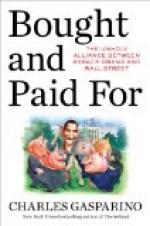Hadley was silent for a few moments, and, sitting lazily back in the comfortable, deep-seated armchair, contented himself with puffing his cigar vigorously and emitting a prodigious quantity of smoke. Finally he said:
“All right, Bob—you know best what you want. Try matrimony, if you’ve a mind to, but remember this—don’t forget I gave you good warning. Marriage isn’t what it’s cracked up to be, by a long shot. The girl you’re courting will seem to you a very different person after marriage. She’ll be an old-man-of-the-sea hanging around your neck whom you can’t shake off. Your trouble will only begin when you take to yourself a wife.” Rising and picking up his hat and gloves, he added: “Now I must be going. I have an appointment at the office at 11:30. What are you going to do? Coming down town with me?”
Stafford pointed to the mass of papers and letters piled up on his desk. Shaking his head he replied:
“No—I can’t go out yet. I must answer all these letters.” Helplessly he added: “I don’t know how I’m going to tackle them. I’ve an awful headache.”
“Why not get a stenographer?”
“A stenographer? That’s not a bad idea. Where can I get one?”
“Why, downstairs. There are two attached to the hotel. They attend to the telephone switchboard and do typewriting as well. One is a girl with red hair and a squint; the other is dark and rather pretty—”
“Very well,” smiled Stafford. “Send me up the pretty one. I couldn’t stand the red-haired girl just now. I’ve got an important deal on hand. She might queer my luck. Do that for me, old chap. Tell her as you go out, and don’t forget—the pretty one.”
“Right you are!” laughed Hadley. “I’ll see you to-night at dinner. Ta ta!” He was going out when he turned round at the door. “Say—don’t forget your virtuous resolution. Don’t make love to the pretty typewriter.”
The door slammed and Stafford was alone.
For some time after his friend disappeared, the railroad man sat idly turning over the mass of papers accumulating on the desk. There was a busy day before him—a directors’ meeting at 2 o’clock, people to see at his office. But just now his thoughts were not on his work. He was cogitating on what he had just admitted to Hadley. Yes, that was it. The truth was out now. He had never acknowledged it before, even to himself. He was tired of his bachelor life. He wanted a wife.
What had all his success been to him? An empty kind of satisfaction, after all. He had made money, more money than he knew what to do with, but it had not brought him real happiness. How could he be happy, when there was no one to share his happiness, his success? His parents were dead; he had no brothers or sisters. He was all alone in the world, and the older he got the more he was beginning to realize how isolated his life was. He had hosts of so-called friends—jolly good fellows of both sexes, who were ready enough to help him spend his money; but what was such friendship as that worth?




